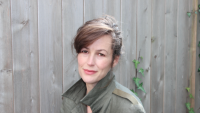March Narrative Medicine Rounds with Sara Hendren
"What Can A Body Do? How We Meet the Built World," a talk by humanist-in-tech Sara Hendren

For March Narrative Medicine Rounds we welcomed Sara Hendren, who is a humanist in tech—an artist, design researcher, writer, and professor at Olin College of Engineering outside Boston.
Her book What Can A Body Do? How We Meet the Built World, named a Best Book of the Year by NPR and LitHub, explores the unexpected places where disability is at the heart of everyday design, and uncovers the lessons available in all the ways our bodies connect with the material world: household objects, architecture, urban planning, and more.
In a series of vivid stories drawn from the lived experience of disability and the ideas and innovations that have emerged from it—from cyborg arms to customizable cardboard chairs to deaf architecture—Sara Hendren invites us to rethink the things and settings we live with. As Katy Waldman writes about the book in The New Yorker: "Hendren, who intends the universality of dependence to inspire in readers a sense of common obligation, critiques the American cult of self-reliance, which equates need with failure and empathy with naïveté. As an inventor, her business is possibility, the brightened future, and she takes less interest in shame than in ingenuity. Given the reality of limits, how do we then transcend them?" By rendering familiar objects and environments newly strange and wondrous, What Can a Body Do? helps us imagine a future that will better meet the extraordinary range of our collective needs and desires.
Hendren's work has been widely exhibited in museum exhibitions and is held in the permanent collections at MoMA and the Cooper Hewitt, and her writing and design work have been featured on NPR, Fast Company, and in The New York Times. She is a former fellow at the New America think tank and the Carey Institute for Global Good. She lives in Boston with her family.
Our moderator for the evening was Rachel Adams, professor of English at Columbia University. Her most recent book is Raising Henry: A Memoir of Motherhood, Disability, and Discovery, published by Yale University Press in 2013 and winner of the 2014 Delta Kappa Gamma Educators' Award. She is also the author of Continental Divides: Remapping the Cultures of North America (University of Chicago Press, 2009) and Sideshow U.S.A.: Freaks and the American Cultural Imagination (University of Chicago Press, 2001). She is co-editor (with Benjamin Reiss and David Serlin) of Keywords for Disability Studies and co-editor (with David Savran) of The Masculinity Studies Reader (Blackwell Press, 2001. She has also written for The New York Times, Washington Post, Salon, the Chronicle of Higher Education, The San Francisco Chronicle and the Times of London. åIn 2010 she was the recipient of the Lenfest Distinguished Columbia Faculty Award and won a Guggenheim Fellowship for 2019-2020.
Narrative Medicine Rounds are monthly rounds on the first Wednesday of the month during the academic year hosted by the Division of Narrative Medicine in the Department of Medical Humanities and Ethics at Columbia University Irving Medical Center. A recording of our Virtual Narrative Medicine rounds will be made available following the live session on the Narrative Medicine YouTube channel. You can also listen to a podcast of past Rounds on iTunes or watch recent ones on YouTube.

